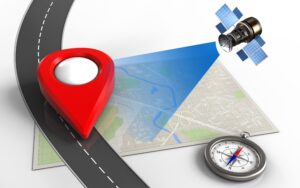How Dependent Are YOU on GPS? And What Happens When It Fails?
Whether you’re using your phone to find directions, checking the time, or even making a card payment, GPS is quietly working behind the scenes to make it all possible.
Originally built for the military, GPS has become a part of everyday life, supporting everything from smartphones and cars to financial systems and power grids.
But what if GPS suddenly stopped working?
As we rely on it more and more, the consequences of losing it grow bigger every day.
We’re so used to having GPS at our fingertips, we rarely think about what would happen if it failed – and that’s the real problem.
Why GPS is So Important
GPS isn’t just for finding the quickest route to your destination. It’s also a vital part of how modern life functions. Many industries from airlines to online banking depend on GPS for what’s called PNT: positioning, navigation and timing. PNT services keep planes flying safely, make sure money transfers happen at the right time and even help run electrical grids.
Think of all the ways GPS helps you daily. If you’re using a map app, ordering an Uber, or even timing your morning run, you’re relying on GPS. But while it’s great when it works, the trouble starts when it doesn’t.
The Vulnerability of GPS
Despite orbiting high above Earth, GPS satellites and their signals are surprisingly easy to disrupt. Their signals, which travel over 20,000 kilometers, become weak by the time they reach us, making them vulnerable to interference. Some issues are accidental, like bad weather or equipment failures. But increasingly, deliberate attacks like jamming and spoofing are being used to mess with GPS signals.
- Jamming is when something blocks GPS signals, so they can’t be used.
- Spoofing is even trickier – it sends out fake GPS signals, fooling devices into thinking they’re somewhere else.
In places like the Black Sea and Mediterranean, GPS blackouts are becoming more common, causing serious issues for ships and planes. And with the growing threat of countries developing ways to disrupt GPS signals, we’re facing real risks. It’s clear that relying only on GPS is risky, especially when it plays such a huge role in how our world operates.
Building Backup Plans for GPS Failures
Governments and tech companies are aware of these risks, and they’re working on backup solutions to protect us when GPS goes down. But progress isn’t the same everywhere.
For example, China has built thousands of kilometres of optical fiber cables to distribute precise timing info as a backup if its GPS alternative, BeiDou, fails. The U.S. military is also making its GPS signals tougher to jam with a new, encrypted version called M-Code. Meanwhile, newer technologies like LEO (Low Earth Orbit) satellites are being explored as a backup. These satellites are closer to the Earth and send stronger signals, which are much harder to jam and work better in cities where GPS often struggles.
Through our partnership with Oscilloquartz a division of Adtran, CoverTel provides the OSA 5405. It’s a small device, about the size of a smartphone, that combines both GPS and another system called STL (Satellite Time and Location). This ensures that even if GPS fails, you still have reliable location and timing information. Devices like this could keep your internet and mobile networks running smoothly, even when GPS goes dark.
Keeping Time Without GPS
One of the biggest problems with losing GPS is that it’s responsible for keeping things like banking and power grids perfectly in sync. This is where atomic clocks come in. These super-precise clocks provide backup timing, ensuring everything stays in sync even if GPS is unavailable. The optical cesium clock, for instance, can keep critical systems running smoothly, offering accuracy to within billionths of a second.
The Future: Multiple Layers of Protection
Given the growing threats to GPS, relying on a single system is no longer safe. The future of GPS protection lies in using multiple sources of PNT data (like GPS, STL, and atomic clocks), all working together to make sure that if one fails, others can step in. This kind of backup system is what experts call a zero-trust network, where every part constantly checks for problems and adapts to keep things running.
CoverTel proudly offers Oscilloquartz’s aPNT+ solutions, which layer multiple PNT sources to provide critical protection for industries like telecommunications and transportation. These systems ensure that operations continue smoothly, even in the event of a GPS failure.
Why This Matters to You
So why should you care?
GPS isn’t just for finding directions – its signals power so many parts of modern life that losing them could lead to serious disruptions. Imagine not being able to get cash from an ATM, having no phone signal, or flights being grounded. These aren’t far-off concerns – GPS blackouts are already happening in some parts of the world.
The good news is that companies and governments are working to make sure we have strong backup systems. From new satellite technologies to precision timing with atomic clocks, we’re getting closer to a world where GPS outages won’t cause chaos. But the need for these solutions is urgent. As our dependency on GPS grows, so does the importance of making sure we’re prepared for the day it doesn’t work.

